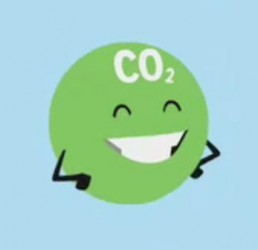You Asked, We Answered
Rebecca Anderson
|April 26, 2012

Dear ACE,
My name is Leila Browne and I am a freshman at Smoky Hill High School, where a representative came to speak several weeks ago. This has sparked my interest, and I am wondering why carbon dioxide is more infamous as a greenhouse gas than water vapor. That is, why are people more afraid of CO2 than H2O? Is it because of more awareness directed towards CO2? But then, why is more attention directed towards CO2?
Hi Leila,
Thanks for your email! This is a great question. It’s true that water vapor is responsible for more of the greenhouse effect than CO2 is. That’s because there’s a lot more water vapor in the atmosphere than CO2.
But the reason we’re more concerned about CO2 is because its amount in the atmosphere is increasing from people burning fossil fuels. Check out this great graph called the Keeling Curve that shows the amount of CO2 in the atmosphere steadily increasing since the 1950s. There’s no question that it’s on the way up.

Water vapor, on the other hand, is sort of a fickle, inconsistent greenhouse gas. Think about the water cycle — water is constantly being evaporated, then rained out again. So the amount of water vapor in the atmosphere changes a lot on a daily basis and from place to place, which means can’t cause longterm climate change on its own. CO2, on the other hand, stays in the atmosphere for decades to centuries. It’s that longevity in the atmosphere that allows it to trap more heat over the longterm and cause climate change.
That’s why people are more concerned with CO2 than water vapor.

Here’s an interesting twist, though: As more CO2 in the atmosphere traps in more heat, that warmer air can hold more moisture (ie, water vapor). So overall, the amount of water vapor in the atmosphere is also going up BECAUSE of CO2 and causing even more climate change. This is what’s called a positive feedback — where you do one thing (warm up the atmosphere) and that triggers something else (more water vapor) which then comes around full-circle and reinforces the first thing (water vapor warms up the atmosphere even more). It’s a vicious cycle.
Does that make sense? Thanks for asking!
Rebecca
Join our Youth Action Network
More Blog Posts
Driving India towards self sufficiency and freedom from oil
India can shield itself from oil-price shocks and global pressure over Russian barrels by leaning harder into two strengths it …
Read More
Unnatural, Not Unprecedented
For two weeks, residents of Southern California endured a waking nightmare. Parents raced against time – hurrying down the driveway …
Read MoreCrafting a Vision for the Future: My Experience at LCOY USA 2024
Dry and sunny Tempe, Arizona where temperatures have been over 100 F for 113 consecutive days, delegates gathered to attend …
Read More
